Trump Selects Former Attorney General William Barr To Be New Attorney General
William Barr, who served as Attorney General under President George H.W. Bush, has been selected to replace Jeff Sessions as Attorney General.
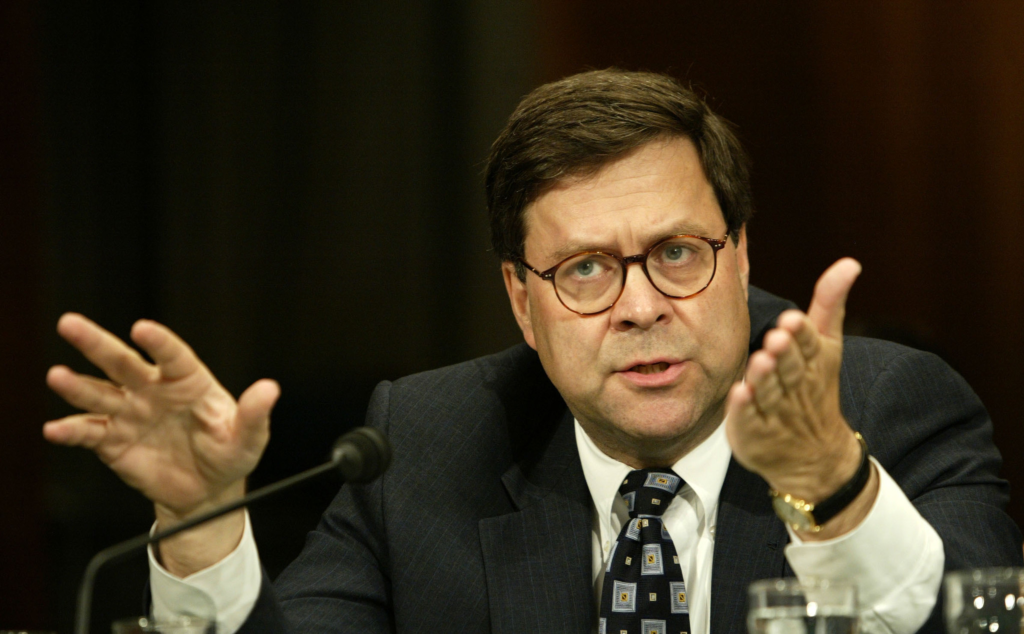
President Trump announced today that he had selected a familiar face to replace Jeff Sessions as Attorney General:
WASHINGTON — President Trump on Friday said he intended to nominate William P. Barr, who served as attorney general during the first Bush administration from 1991 to 1993, to return as head of the Justice Department.
“He was my first choice since Day 1,” Mr. Trump told reporters as he walked from the White House to a helicopter for a trip to Kansas City, Mo. “He’ll be nominated.”
Mr. Trump’s focus on Mr. Barr, who supports a strong vision of executive powers, had emerged over the past week following the ouster last month of Jeff Sessions as attorney general and the turbulent reception that greeted his installation of Matthew G. Whitaker as the acting attorney general.
(…)
The choice of Mr. Barr was well received by Republicans as soon as s it became known that he had emerged as permanent replacement for Mr. Sessions.
Senator John Cornyn of Texas, the No. 2 Senate Republican, predicted that Republicans would be able to secure the votes needed to confirm him — one of the highest potential hurdles for any Justice Department nominee given the ongoing special counsel investigation.
“He is the kind of person who could get confirmed,” he said. “I think it is going to be challenging in any event.”
But parts of his record are likely to be closely scrutinized by Democrats. Mr. Barr has criticized aspects of the Russia investigation, including suggesting that the special counsel, Robert S. Mueller III, hired too many prosecutors who had donated to Democratic campaigns. He also has defended Mr. Trump’s calls for a new criminal investigation into his 2016 opponent, Hillary Clinton, including over a uranium mining deal the Obama administration approved when she was secretary of state.
“There is nothing inherently wrong about a president calling for an investigation,” Mr. Barr told The New York Times last year. “Although an investigation shouldn’t be launched just because a president wants it, the ultimate question is whether the matter warrants investigation.”
Mr. Barr added then that he saw more basis for investigating the uranium deal than any supposed conspiracy between Mr. Trump’s associates and Russia. “To the extent it is not pursuing these matters, the department is abdicating its responsibility,” he said.
Mr. Barr has a “generally mainstream G.O.P. and corporate” reputation, Norman L. Eisen, who served as special counsel for ethics and government overhaul under President Barack Obama, said on Thursday. But he predicted that Mr. Barr would be vigorously vetted because of what he saw as blots on Mr. Barr’s record, including his push for scrutiny of the mining deal, involving a company called Uranium One.
Mr. Barr “has put forward the discredited idea that Hillary Clinton’s role in the Uranium One deal is more worthy of investigation than collusion between Trump and Russia,” Mr. Eisen wrote in a text message. “That is bizarre. And he was involved in the dubious George H.W. Bush end of term pardons that may be a precedent for even more illegitimate ones by Trump.”
Senator Richard Blumenthal, Democrat of Connecticut, said on Friday that Democrats would carefully vet him
“I will demand that Mr. Barr make a firm and specific commitment to protect the Mueller investigation, operate independently of the White House, and uphold the rule of law,” Mr. Blumental said in a statement. He deserved particular scrutiny, the senator said, “in light of past comments suggesting Mr. Barr was more interested in currying favor with President Trump than objectively and thoughtfully analyzing law and facts.”
Barr, who graduated from Columbia University and received his Juris Doctorate from George Washington University, is no stranger to government service. From 1989 to 1990 under President George H.W. Bush, Bar served as the Assistant Attorney General for the Justice Department’s Office of Legal Counsel. After a year in that position, he was drafted to become the second highest ranking person in the Justice Department and served as Deputy Attorney General from 1990 to 1991. Beginning in November 1991 and continuing through the end of the Bush 41 Administration, Barr served as the nation’s 77th Attorney General. If confirmed, Barr would be among a small handful of men who have served as Attorney General under more than one Administration, and one of the few who was appointed and confirmed to the position more than once rather than merely having served as Acting Attorney General in the past before being confirmed in their own right at a later date.
Based on his resume and past experience, it seems clear that Barr’s nomination will face few if any headwinds when it is submitted to the Senate, which presumably won’t formally happen until after the new Senate takes office in January. At that point, of course, Republicans will have a 53-47 seat majority, meaning that it should be relatively easy to get his nomination through even if Senate Majority Leader McConnell ends up having to deal with a defection or two which, with the exception of Susan Collins and Lisa Murkowski, seems unlikely. Additionally, Barr’s record and his ties to the Bush 41 Administration are likely to help deflect many of the concerns that would otherwise be raised about a Trump nominee for this particular position.
That isn’t to say that Barr’s record and previously stated views don’t raise some concerns, of course. In addition to the inevitable concerns about how he might approach the ongoing investigation of Russian interference in the 2016 election and related issues being handled by Special Counsel Robert Mueller, an investigation he would assume supervisory control over if he were confirmed, Barr has expressed views on Executive Branch authority that certainly are cause for concern:
In July 1989, shortly after his appointment to the Office of Legal Counsel, Mr. Barr sent an apparently unsolicited 10-page memo to top agency and department lawyers across the executive branch urging vigilance in pushing back against ways in which Congress might try to intrude on what he saw as the rightful powers of the president. It covered topics such as “attempts to gain access to sensitive executive branch information” and efforts to limit a president’s power to fire a subordinate official without a good cause.
“It is important that all of us be familiar with each of these forms of encroachment on the executive’s constitutional authority,” Mr. Barr wrote. “Only by consistently and forcefully resisting such congressional incursions can executive branch prerogatives be preserved.”
Years later, in 2005, after the leaking of a secret George W. Bush administration memo blessing the torture of terrorism detainees despite anti-torture laws and treaties, Neil Kinkopf, a Georgia State law professor who worked in the Office of Legal Counsel during the Clinton administration, pointed back to Mr. Barr’s 1989 memo as a precursor to the torture memo’s vision of unfettered executive power.
“Never before had the Office of Legal Counsel, known as the O.L.C., publicly articulated a policy of resisting Congress,” Mr. Kinkopf wrote in a Legal Affairs essay. “The Barr memo did so with belligerence, staking out an expansive view of presidential power while asserting positions that contradicted recent Supreme Court precedent.”
He added, “Bridging a 15-year gap, the Barr memo provides the theoretical and strategic foundations for the torture memo.”
Many proponents of strong presidential powers nevertheless say that Congress can check the presidency through its power over government spending. But at a 1990 symposium, Mr. Barr invoked a constrained understanding of lawmakers’ ability to cut off funds for government actions they oppose, declaring that “Congress cannot use the appropriations power to control a presidential power that is beyond its direct control.”
And when issues of war power came up — like Mr. Bush’s 1989 invasion of Panama, the 1990-91 Persian Gulf War or the 1992 deployment of troops to Somalia — Mr. Barr repeatedly told Mr. Bush that he could deploy American troops without specific prior authorization from Congress.
Vox’s German Lopez also raises some other potential areas of concern:
Here are some examples, noted in part by Grawert, of Brennan, and civil rights lawyer Sasha Samberg-Champion:
- As deputy attorney general from 1990 to 1991 and attorney general from 1991 to 1993, Barr pushed for and helped implement more punitive criminal justice policies, including a 1990 crime law that, among other things, escalated the war on drugs.
- In 1992, Barr signed off on a book by the Department of Justice titled The Case for More Incarceration. In a letter of support, Barr argued that “there is no better way to reduce crime than to identify, target, and incapacitate those hardened criminals who commit staggering numbers of violent crimes whenever they are on the streets.” He also called on the country to build more jails and prisons. (Although he specified violent criminals, the federal system, unlike the much larger state systems, locks up mostly drug offenders.)
- In 1992, asked about racial disparities in prisons by Los Angeles Times reporter Ronald Ostrow, Barr argued that “our system is fair and does not treat people differently.” He went on to defend laws that made prison sentences for crack cocaine much harsher than prison sentences for powder cocaine. The disparity between the two was reduced by the Fair Sentencing Act of 2010, in part because there’s little justification for it based on the drugs’ effects, but the higher sentence for crack has a disproportionate racial impact since crack was more commonly used in black communities and powder cocaine was more commonly used in white communities.
- In 1994, Barr co-chaired a commission for Virginia’s governor that released a plan to abolish parole (which allows certain inmates to go free before the completion of their sentences) in the state, increase prison sentences, and build more prisons.
- Barr also once said that it was “simply a myth” that there were “sympathetic people” and “hapless victims of the criminal justice system” in prisons, according to David Krajicek at Salon.
It’s possible that Barr’s views have evolved since then, just as many people’s views have toward the drug war and mass incarceration, particularly as crime has plummeted in the past two decades.
All of these areas ought to be examined during Barr’s nomination process, of course, but in the end, the odds are that he will be confirmed and that he’s likely to get at least some Democratic votes along the way.

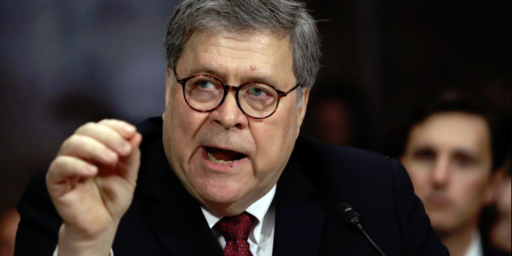
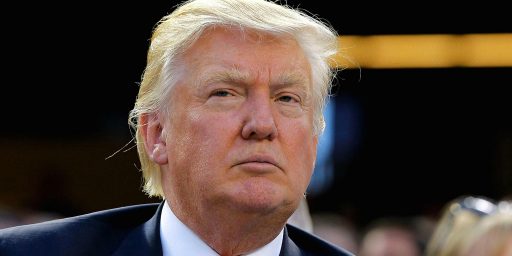
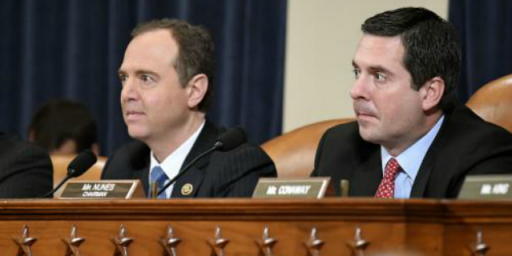
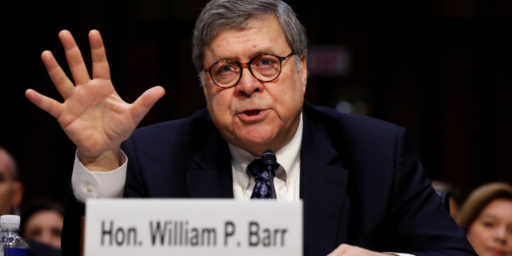
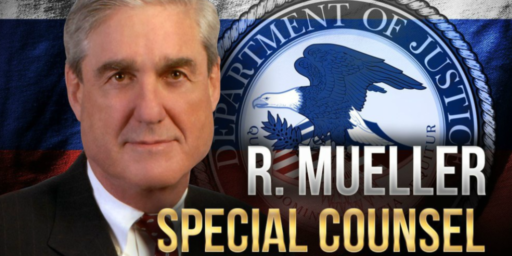
TBF, Barr’s “tough on crime” stance of the early 90’s was held by everyone in politics, including the vast majority of Democrats. Be curious to hear what he has to say now.
Although I don’t doubt I have significant policy differences with this guy, it is so odd not to have a WTF moment when I encounter a Trump nominee (see, e.g., Nauert, Heather).
But he told the Times that he saw more of a basis for investigating Clinton’s involvement in a uranium deal as secretary of state than he saw for investigating possible collusion between Trump and Russia.
IOW, he thinks a phony scandal is more worthy of an investigation than Russian collusion. Trump managed to find an AG who will go after his political opponents.
I see two small slivers of silver lining.
1) It’s one thing to suck up to the prospective boss when you’re angling for a job, and a different one to commit obstruction of justice to cover his orange ass. Sure, Dennison will promise him a pardon. But would you bet your life on his word?
2) He will have oversight by a Democratic House.
Are you surprised that would be one of the qualifications?
If he’s trump’s choice, he’s obviously too corrupt for the job.
@Hal_10000:
100%.
Even today this is still a popular refrain in certain aspects of the Democratic party (especially around certain categories of crime).
In soon to be related news, Michael Cohen appears to be going away from 2 to 4 years.
It might be a ploy to get him to talk more, but I don’t think so.
Barr, with his aversion to congressional oversight and concerns about investigations of Republicans, should fit nicely into the Trumpsky administration. Maybe we should learn from this how little distance there was between the supposedly respectable HW Republicans and the Trumpskyites.
@Kathy:
More importantly, since they state that Cohen violated the law at the direction of Individual 1 [Donald Trump], they are stating that Individual 1 is also guilty of a campaign finance violation.
I wonder how long Barr will last.
The Justice Department – the SDNY – and not Mueller, has now in effect accused Trump of felonies. If he was literally anyone other than the POTUS he’d be indicted now. And if they are resting their sentencing recc on this it means they have proof.
For the slow class (not naming any names) this means that Cohen has confessed to felonies which according to prosecutors he did at Trump’s direction. That makes Trump even more culpable than Cohen. And Cohen is going to prison.
From what I see the idea that a sitting president can’t be indicted is really an expectation that Mueller will defer to an untested DOJ opinion. I wonder how SDNY feels about it.
@OzarkHillbilly: I think I know why Trump may have chosen this person over others. In the last week we have seen a lot of praise and positive comments from everyone including the media and Democrats of former President George H. Bush: and deservedly so.* Trump is riding this wave of sentiment knowing that they would hesitate to criticise a Bush protege: they would look ridiculous.
*President Bush is certainly in the league of leaders with integrity and honor: Truman, Kennedy, Johnson, Ervin, Fulbright, Humphrey, Carter, Connally, Rockefeller, Ford.
I can’t understand why Guarneri hasn’t dropped by to tell us it’s nothing that Trump stands accused of committing felonies.
He will, though. The true Culties will absolutely abandon law and embrace one man rule. Seriously. Fortunately there are more of us.
@mattbernius:
Come now. “Individual 1” could be any other billionaire who was running for office in 2016 and wanted to build a Trump tower in Moscow.
In unrelated but good news, the alt-right thug who thought he could get away with murder didn’t.
And this piece of scum can’t get a pardon from the Nazi Apologist in Chief.